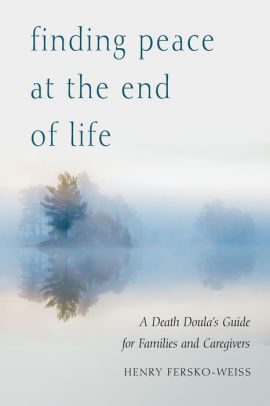Most books about death and the end of life are academic and religious (usually monotheistic). Finding Peace at the End of Life was insightful, deeply moving and sensitively written. The author, Henry Fersko-Weiss, is the executive director of the International End of Life Doula Association. He created the first End of Life Doula Program in the United States at a hospice in New York City. He is on the faculty of the Open Center's Art of Dying Institute.
I was deeply moved reading the descriptions of the work death doulas -- mostly volunteers -- undertake, and inspired by the authors' determination to improve. Finding Peace is the author's summation of the close to 20 years of serving people who are dying and their families. Fersko-Weiss sees the end of life as a gift, a place where we come to "find the best of who we are. It [death] strips away everything that is unimportant and leaves what is essential. It opens us to great love, generosity, and courage."
It is difficult to find frank and practical advice for approaching the wide variety of complicated end of life challenges that arise. Zen Buddhism inspires some of the author’s ideas, particularly around how mindfulness allows doulas to be active listeners, but Finding Peace espouses no particular religion and offers distinctly secular prayers and rituals. At the same time, its case studies, diverse and compassionately told, explore the place belief has in planning for life’s end: a family decides whether their grandfather should be buried in the Orthodox Jewish fashion, and through guided imagery a dying ex-priest discusses his doubts with his hometown minister. The book holds broad appeal. It is a companion for the dying and their families, and will also interest psychologists and anthropologists studying how we narrate the past and visualize the future.
Death is often unpredictable, yet the author emphasizes being as prepared as possible and offers indicators to the physical signs that death is imminent. The dying, too, are involved in preparations: by crafting their legacy and expressing end-of-life wishes, they “regain a sense of purpose.” He advocates cultivating active listening deeply, creating legacy projects, using guided imagery, and creating rituals to process the grief felt by all involved.
This is a sensitive, practical, and truly important book.
Highly recommended.
~review by: Lisa Mc Sherry
Author: Henry Fersko-Weiss
Red Wheel, 2020
pp. 256, $16.95
Note: previously published as Caring for the Dying in 2017. Clicking on the title will take you to our review.
Finding Peace at the End of Life: A Death Doula's Guide for Families and Caregivers

©
2010 - 2026
Facing North
